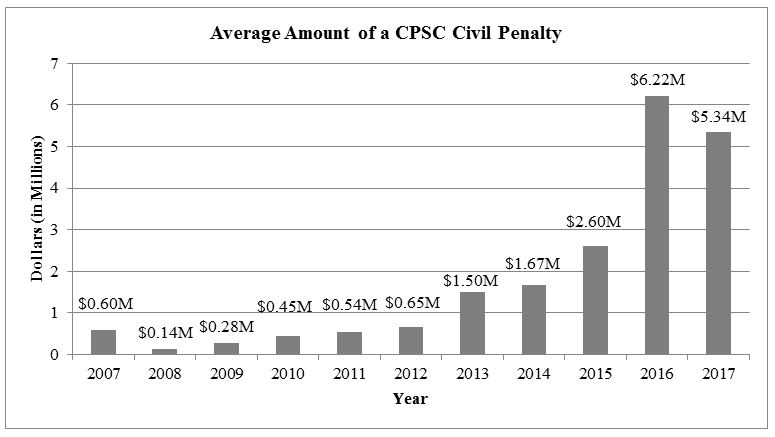This month marks the 10th anniversary of the Consumer Product Safety Improvement Act (“CPSIA”), which was signed into law on August 14, 2008. CPSIA was a bipartisan response to unsettling events in the world of consumer products that occurred in 2007. During that landmark year, reports emerged about lead contamination in a wide range of consumer products—including children’s toys—that forced the CPSC into the national spotlight and facilitated over 400 recalls. The CPSIA aimed to significantly enhance the CPSC’s regulatory and enforcement power by doubling its budget, increasing its staff levels, prohibiting the sale of recalled products and increasing its civil penalties. For example, before CPSIA, the CPSC could impose civil penalties in the amount of $8,000 per violation, with a maximum of $1.825 million. But in 2008, CPSIA increased significantly the amount of civil penalties to $100,000 per violation, with a maximum of $15 million, adjusted for inflation. Ten years later, the industry has seen the average amount of a CPSC civil penalty surge exponentially:

In other news, a few aspects of August’s recalls are noteworthy. A manufacturer recalled its electric space heaters this month after receiving reports that 19 of the heaters have caught fire. Sadly, one of these fires resulted in the death of a 90-year-old man in December 2017. Also this month, nearly half of August’s recalls (9 of 22 recalls) concerned outdoor vehicles, including bicycles, motorcycles, snowmobiles, utility vehicles and recreational off-road vehicles (“ROVs”). This development is consistent with the CPSC’s continued focus on ROVs and all-terrain vehicles, which included the largest civil penalty in CPSC history—$27.25 million—back in April.
Attorneys from Hunton Andrews Kurth LLP’s Insurance Coverage practice group weigh in on two recent food recall insurance disputes.
In the first case, Starr Surplus Lines Insurance Co. v. Mountaire Farms, Inc., No. 2:18-cv-67-JDL (D. Me. Aug. 02, 2018), a federal district court in Maine dismissed a lawsuit brought by Starr, a subrogee, against a chicken supplier, Mountaire Farms, asserting that Mountaire delivered contaminated chicken products to Starr’s insured, AdvancePierre Foods, that resulted in recall of more than 1,700,000 pounds of chicken products. AdvancePierre contracted with Mountaire to deliver raw chicken parts to use in its Portland processing facility. Mountaire delivered more than 100,000 pounds of chicken to AdvancePierre that were later linked to a salmonella outbreak in Wisconsin and Minnesota. The salmonella scare led AdvancePierre to recall 1.7 million pounds of chicken product, costing it more than $10 million in damages. AdvancePierre’s investigation linked the outbreak to two truckloads of chicken it received from Mountaire.
AdvancePierre submitted a recall insurance claim to its insurer, Starr, which paid the policy limits of $10 million. Starr then initiated a subrogation lawsuit against Mountaire to recover the $10 million it paid to AdvancePierre, asserting claims for breach of implied warranties of merchantability and fitness for a particular purpose and for strict liability arising from Mountaire’s allegedly contaminated deliveries. Mountaire moved to dismiss Starr’s lawsuit, arguing, among other things, that Starr’s claims fail because salmonella is an “inherent and recognized characteristic” of raw chicken and, therefore, could not be considered “defective,” “unfit for its particular purpose” or “unreasonably dangerous,” which are required elements of Starr’s claims. Mountaire further argued that Starr’s strict liability claim is barred by the economic loss doctrine. The court agreed with both arguments and dismissed the lawsuit.
First, applying Maine’s “reasonable expectation test” for defective food product claims, the court found that the average consumer should reasonably expect that raw, uncooked chicken is not safe for human consumption and, therefore, the existence of salmonella in the raw chicken could not be considered a product defect. Second, the court held that the economic loss doctrine barred Starr’s strict liability claim because Maine courts do not permit tort recovery for economic losses like the claimed recall costs without a claim of personal injury or damage to other property. The Mountaire decision underscores the importance of strong recall insurance coverage to adequately protect from contamination and recall events, given that losses arising from inherent or naturally occurring food “defects” may not be sufficient grounds to recover directly from the supplier under a product liability theory in the event that insurance proceeds are insufficient.
In the second case, JSL Foods, Inc. v. Certain Underwriters at Lloyd’s London, No. BC718081 (Cal. Super. Ct., Los Angeles Cnty. filed Aug. 14, 2018), cookie manufacturer JSL Foods sued Lloyd’s for alleged wrongful breach of its duty to reimburse JSL for over $890,000 in losses that JSL incurred as the result of a voluntary product recall after one of its customers received complaints that cookies it received from JSL were contaminated with mold. The Lloyd’s product recall insurance policy at issue provided coverage for losses incurred by JSL due to “accidental contamination,” which is defined to mean an unintentional error by JSL in the manufacturing of products, provided that consumption of the product would lead to bodily injury, sickness or death.
JSL provided detailed supporting documentation, including photographs of the moldy cookie products, to Lloyd’s in various claim submissions. Lloyd’s ultimately denied coverage, however, on the grounds that there was no proof that the customers’ consumption of the cookies would lead to bodily injury, sickness, disease or death, or that the voluntary recall was undertaken because the product was dangerous to customers’ health, stating that “[t]he fact that something should not be consumed does not necessarily mean that the mold will cause bodily injury or sickness.” JSL alleges in its complaint that “Lloyd’s position belies basic common sense and federal recommendations,” citing USDA guidance suggesting that consumption of moldy foods can lead to a number of illnesses.
Unable to resolve the dispute through extensive pre-suit negotiation and mediation, JSL now seeks to recover more than $890,000 in damages due to Lloyd’s alleged breach of contract and the implied covenant of good faith and fair dealing. JSL outlines numerous instances of improper and unlawful conduct in Lloyd’s claims handling practices, including repeatedly making excessive and duplicative requests for information and imposing onerous testing requirements on JSL to analyze the presence of mold in the contaminated products that was already substantiated by JSL’s other evidence.
The Lloyd’s coverage position in JSL’s lawsuit, if true, seems extreme and at a minimum conflicts with the spirit if not the letter of the product contamination policy, which JSL obtained to protect its products from contamination by forms of mold that would be harmful if ingested. It is unclear from the complaint whether further testing of the presence of the contaminated products is still underway. We will continue to monitor this lawsuit for further developments.
Total Recalls: 22
Hazards: Fire/Burn/Shock (8); Injury (4); Crash (3); Fall (2); Laceration (1); Choke (1); Entrapment (1); Violation of Federal Standard (1); Explosion (1)
Click on the below chart for additional information.
- Partner
Syed represents clients in connection with insurance coverage, reinsurance matters and other business litigation. Syed serves as the head of the firm’s insurance coverage practice. He has been admitted to the US Court of Appeals ...
- Partner
Kelly practices as a commercial and regulatory litigator on products liability and post M&A disputes and issues and serves as one of the firm’s Deputy General Counsel focusing on law firm ethics, conflicts, and risk management ...
- Partner
Geoff works closely with corporate policyholders and their directors and officers to resolve high-stakes insurance disputes. He leads the firm’s directors and officers (D&O) insurance and executive protection practice.
As a ...
Search
Recent Posts
Categories
- Advertising & Marketing
- Bankruptcy
- Class Action
- Competition/Antitrust
- Consumer Protection
- Corporate Governance
- Environmental
- General
- Health Care
- Insurance
- IP
- Labor and Employment
- Mergers & Acquisitions
- News & Events
- Patent Infringement
- Patents
- Privacy & Cybersecurity
- Product Liability
- Real Estate
- Regulatory
- Technology & E-Commerce
Tags
- 29 C.F.R. § 785.48
- 396-r
- 3D Printer
- 3D Printing
- A. Todd Brown
- A.S. Research (ASR)
- Aaron P. Simpson
- Accountability
- Administrative Agencies
- Administrative Exemption
- Advertisers
- Advertising
- Advertising Claims
- Advertising Guidelines
- Advertising Idea
- Agency Guidance
- Agency Principles
- AI
- AI Interviewing Platforms
- AI Technology Reviews
- AIA
- Air
- Algorithmic Accountability Act
- Align
- Americans with Disabilities Act
- Americans with Disabilities Act (ADA)
- Andrea DeField
- Ann Marie Buerkle
- Annual Reports
- anti-aging
- Anti-Discrimination
- APEX Agreement
- Arbitration
- Arbitration Agreements
- Arizona
- Arkansas
- Arthritis
- Artificial Intelligence
- Artificial Intelligence (AI)
- Asbestos
- Assembly Bill 51 (AB 51)
- ATDS
- Australia
- Auto-renewals
- Automatic Telephone Dialing System (ATDS)
- Automobile
- Automotive Body Parts Association (ABPA)
- Back to Work Emergency Ordinance
- biased endorsements
- Biden Administration
- Biometric Data
- Biometric Information
- Biometric Information Privacy Act (BIPA)
- BIPA
- Bitcoin
- Blockchain
- Board Diversity Disclosure
- Boards of Directors
- Bonuses
- Braille
- Branding
- Breach
- Breach of Contract
- Business Interruption
- Business Interruption Loss
- Businessowner’s Insurance
- California
- California Air Resources Board
- California Assembly Bill 2011
- California Employment Laws
- California Fair Employment and Housing Act
- California False Claims Act
- California Labor Code
- California Legislation
- California Senate Bill 6
- California’s Unfair Competition Law
- CAMS
- Canada
- Cannabis
- CARB
- CBD
- CBP
- CCPA
- Celebrity Endorsers
- Center for Disease Control (CDC)
- CFIUS
- CGL
- Chatbot
- Children’s Advertising
- Children’s Advertising Review Unit
- Children’s Online Privacy Protection Act (COPPA)
- China
- Christopher J. Dufek
- Christopher W. Hasbrouck
- Christy Kiely
- CIPA
- Class Action
- Class Action Litigation
- Class Actions
- Clawback
- Click-to-Cancel
- Climate Change
- Climate Disclosure
- clinical trials
- Collective Action
- Colorado
- Commerce Clause
- Commercial General Liability
- Commercial Leasing
- Commercial Messaging
- Commercial Products
- Commercial Real Estate
- Commodity Futures Trading Commission
- Compensation
- Compliance
- Confidentiality
- Congress
- Connecticut
- Consent
- Consent Order
- Consumer Advertising
- Consumer Data
- Consumer Financial Protection Bureau
- Consumer Fraud
- consumer loyalty program
- Consumer Privacy
- Consumer Product Safety Act
- Consumer Products
- Consumer Products Safety Commission (CPSC)
- Consumer Protection
- Consumer Review Fairness Act of 2016 (CRFA)
- Consumer Reviews
- Consumer Rights
- Contamination
- Contract Law
- Controlled Substance Act
- Cookies
- Cookware
- COPPA
- Copyright
- Coronavirus/COVID-19
- Corp Fin
- Corporate Governance
- Corporate Reporting
- Corporate Sustainability
- Corporate Transparency Act (CTA)
- Costco
- Counterfeit Goods
- Counterfeit Goods Seizure Act of 2019
- Court of International Trade
- CPPA
- CPRA
- CPSA
- CPSC
- Crack House Statute
- CRFA
- Crypto
- Cryptocurrency
- CSPA
- Cuba
- Currency
- Customs and Border Protection
- Cyber
- Cyber Coverage
- D&O
- D&O policies
- D. Andrew Quigley
- Damages
- Data Breach
- Davidson
- Deceptive Advertising
- DEI
- Delaware
- Delivery Drivers
- DEP
- Department of Agriculture
- Department of Justice
- Department of Labor
- Development Impact Fee
- Dietary Guidelines
- Digital Assets
- digital currency
- Disclosures
- Distribution
- Division of Corporation Finance
- Dodd-Frank
- DOJ
- DOL
- Duty to Defend
- Duty to Indemnify
- e-liquid products
- Eddie Bauer
- EEOC
- Electric Vehicles
- Eleventh Circuit
- Emily Burkhardt Vicente
- Employee Rights
- Endorsement
- Endorsement Guides
- Endorsement Notice
- Endorsements
- endorser monitoring requirements
- Enforcement
- Environmental Impact
- Environmental Protection Agency
- Environmental Protection Agency (EPA)
- EPA
- Epidemic
- ESG
- ESG Disclosure
- EU Regulation
- European Union
- European Unitary Patent
- EV Charging
- Exceptions
- Exclusions
- Executive Compensation Disclosure Rules
- Executive Order
- Executive Orders
- Exercise Machines
- Extended Producer Responsibility (EPR)
- FAA
- Fair Labor Standards Act
- Fair Labor Standards Act (FLSA)
- fair use
- False Advertising
- False Advertising Claims
- False Advertising Law
- False Claims Act
- Family Leave Policies
- FAR
- FCC
- FCRA
- FDA
- Federal Acquisition Regulations
- Federal Arbitration Act (FAA)
- Federal Communications Commission
- Federal Contractors
- Federal Contracts
- Federal District Court
- Federal Government Contractor
- Federal Government Shutdown
- Federal Trade Commission
- Federal Trade Commission (FTC)
- FFDCA
- FIFRA
- Fifth Circuit
- Final Rule
- Financial Technology
- FinCEN
- FinHub
- Fireworks
- First Amendment
- Fixing America’s Surface Transportation (FAST) Act
- Florida
- Florida House of Representatives (HB 963) and Florida Senate (SB 1670)
- Florida Legislature
- FLSA
- FLSA/Wage & Hour
- FMLA
- Food and Beverage Manufacturers
- Food and Drug Administration (FDA)
- Food Delivery
- Food Safety
- Form 10-K
- Formaldehyde Standards for Composite Wood Products Act of 2010
- fractional interests
- Franchise
- Frederic Chang
- Free Trials
- FTC
- FTC Act
- Gavin Newsom
- GDPR
- General Liability
- Geoffrey B. Fehling
- Georgia
- Gift Cards
- GoodRx
- Gramm-Leach-Bliley (GLB) Act
- Green
- Green Guides
- Greenhouse Gas
- Gun Safety
- Hart-Scott-Rodino
- Hart-Scott-Rodino (HSR)
- Hashtag
- Hawaii
- Health Care
- Health Claims
- Hedge Fund
- HIPAA
- hoverboards
- human capital
- Human Rights
- IEEPA
- Illinois
- Illinois Artificial Intelligence Video Interview Act (the Illinois Act)
- Illinois Biometric Information Privacy Act (BIPA)
- Independent Contractors
- Indiana
- Indoor Mall
- Influencer Marketing
- Infringement
- initial public offerings (IPOs)
- Injury
- Insurance
- Insurance Loss
- Insurance Provider
- Intellectual Property
- Intellectual Property Licenses in Bankruptcy Act
- Inter Partes Review
- Interest Rate
- International
- International Trade Commission
- International Trade Commission (ITC)
- Internet
- Inventorship
- investigation
- INVISALIGN
- Iowa
- IP
- IPR
- Ireland
- IT
- ITC
- iTERO
- Job Posting
- Junk Fees
- Katherine Miller
- Kurt A. Powell
- Kurt G. Larkin
- Labeling
- Labeling Requirements
- Labeling Rules
- Labor
- Labor Code Private Attorneys General Act of 2004 (PAGA)
- Labor Organizing
- Labor Unions
- Land Use
- Landlord
- Latin America
- Lautenberg Act
- Lawsuit Reform Alliance of New York (LRANY)
- Lead
- Lease
- Legislation
- Leveraged Loans
- Liability Insurance Policy
- Liberty Insurance Corporation
- Liberty Mutual Fire Insurance Company
- LIBOR Discontinuation
- liquidity
- Litigation
- Live Chat
- Lost Profits
- Lost Sales
- Louisiana
- M&A
- Made in the USA
- Made in USA
- MagicSleeve
- Magnuson-Moss Warranty Act
- Magnuson-Moss Warranty Act (MMWA)
- Maine
- Malcolm C. Weiss
- Manufacturing
- Marketing Claims
- Maryland
- Massachusetts
- Matthew T. McLellan
- Maya M. Eckstein
- MD&A
- Medtail
- Membership cancellation
- Mergers & Acquisitions
- Metaverse
- MeToo Movement
- Mexico
- Michael J. Mueller
- Michael S. Levine
- microplastics
- Microplastics Litigation
- Minimum Wage
- Minnesota
- Minnesota Pollution Control Agency (MPCA)
- Misclassification
- Mislabeling
- Mission Product Holdings
- Missouri
- Mobile
- Mobile App
- Motoclick
- Multi-Family Housing Development
- Multi-Level Marketing Program (MLM)
- NAA
- NAD
- NASA
- Nasdaq
- National Advertising Division
- National Advertising Division (NAD)
- National Advertising Review Board
- National Labor Relations Act
- National Labor Relations Board
- National Products Inc.
- National Retail Federation
- Natural Disaster
- Nebraska
- Negligence Claims
- Neil K. Gilman
- Network Outage
- Nevada
- New Jersey
- New York
- New York City Department of Consumer and Worker Protection
- NHTSA
- NIL rights
- Ninth Circuit
- NLRA
- NLRB
- no-action request
- Non-Compete
- Non-Exempt
- Non-Exempt Employees
- non-fungible token (NFT)
- North Carolina
- Nutrition Labels
- Obama Administration
- Occupational Safety and Health Administration (OSHA)
- Occurrence
- Office of Labor Standards Enforcement
- Ohio
- Oklahoma
- Online Cash Providers
- Online Retailer
- Online Reviews
- Opinion Letters
- Opioids
- Oregon
- Overboarding
- Overtime
- Overtime Exemptions
- Ownership
- Packaging
- PAGA
- Pandemic
- Patent
- Patent Infringement
- Patents
- Paul T. Moura
- Pay Equity
- Pay Ratio
- Pay Transparency
- Pay-To-Play Rankings
- Penalty
- Pennsylvania
- Personal and Advertising Injury
- Personal Data
- Personal Information
- Personally Identifiable Information
- Pesticides
- PFAS
- Physical Loss or Damage
- Policy
- price gouging
- Primary and Umbrella Policies
- Privacy
- Privacy Guidelines
- Privacy Policy
- Privacy Protections
- Procurement
- Product Liability
- Product Packaging
- Prohibition on Sale
- Property Insurance
- Property Rights
- Proposed Legislation
- Proposition 65
- Proxy Access
- proxy materials
- Proxy Statements
- PTAB
- PTO
- Public Companies
- Purdue Pharma
- Randall S. Parks
- Ransomware
- Real Estate
- Recall
- Recalls
- Recording
- Regulation
- Regulation S-K
- Restaurants
- Restrictive Covenants
- Retail
- Retail Developers
- Retail Development
- Retail Industry Leaders Association
- Retail Litigation Center
- Retail Year in Review
- Rounding
- Rulemaking
- Ryan A. Glasgow
- Sales Tax
- Salesforce
- SD8 coins
- SEC
- SEC Disclosure
- Second Circuit
- Section 337
- Section 365
- Secure and Fair Enforcement Banking Act of 2019 (“SAFE Banking Act”)
- Securities
- Securities and Exchange Commission
- Securities and Exchange Commission (SEC)
- Securities Exchange Commission
- security checks
- Senate
- Senate Data Handling Report
- Sergio F. Oehninger
- Service Contract Act (SCA)
- Service Interruption
- Service Provider
- SHARE
- Shareholder
- Shareholder Proposals
- Sign-In Wrap Agreement
- Slogan
- Smart Contracts
- SNAP
- Social Media
- Social Media Influencers
- Software
- South Carolina
- South Dakota
- Special purpose acquisition companies (SPACs)
- Sponsors and Gifting
- Sponsorship
- State Attorneys General
- State Law
- State Legislation
- Store Closures
- Subscription Services
- Substantiation
- Substantiation Notice
- Supplier
- Supply Chain
- Supply contracts
- Supreme Court
- Sustainability
- Syed S. Ahmad
- Synovia
- Targeted Advertising
- Tariff
- Tax
- TCCWNA
- TCPA
- Technology
- Technology Innovation
- Telemarketing
- Telephone Consumer Protection Act
- Telephone Consumer Protection Act (TCPA)
- Tempnology LLC
- Tenant
- Tennessee
- Terms and Conditions
- Texas
- The Fair Credit Reporting Act (FCRA)
- Third-Party
- Thomas R. Waskom
- Title VII
- Tokenization
- Tokens
- Toxic Chemicals
- Toxic Substances Control Act
- Toxic Substances Control Act (TSCA)
- Trade Dress
- Trademark
- Trademark Infringement
- Trademark Trial and Appeal Board (TTAB)
- TransUnion
- Travel
- Trump Administration
- TSCA
- TSCA Title VI
- U.S. Department of Justice
- U.S. Department of Labor
- U.S. Food and Drug Administration
- U.S. House of Representatives
- U.S. Patent and Trademark Office
- Ultra-Processed Foods
- Umbrella Liability
- Unfair and Deceptive Use
- Union
- Union Organizing
- United Specialty Insurance Company
- Unmanned Aircraft
- Unruh Civil Rights Act
- UPSTO
- US Chamber of Commerce
- US Customs and Border Protection (CBP)
- US Environmental Protection Agency (EPA)
- US International Trade Commission (ITC)
- US Origin Claims
- US Patent and Trademark Office
- US Patent and Trademark Office (USPTO)
- US Supreme Court
- USDA
- USPTO
- Utah
- Varidesk
- Vendor
- Vermont
- Virginia
- Volatile Organic Compound (VOC) Emissions
- W. Jeffery Edwards
- Wage and Hour
- Wage-And-Hour
- Walter J. Andrews
- Warning Labels
- Warranties
- Warranty
- Washington
- Washington DC
- WCAG
- Web Accessibility
- Website
- Website Accessibility
- Weight Loss
- Wiretap
- Wiretapping
- World Health Organization (WHO)
- Wyoming
- Year In Review
- Zoning
- Zoning Conversion
- Zoning Ordinances
- Zoning Regulations
Authors
- Gary A. Abelev
- Alexander Abramenko
- Yaniel Abreu
- Christian S. Adams
- Syed S. Ahmad
- Brandon Bell
- Fawaz A. Bham
- Michael J. “Jack” Bisceglia
- Jennifer L. Bloom
- Jeremy S. Boczko
- Brian J. Bosworth
- Shannon S. Broome
- Samuel L. Brown
- Tyler P. Brown
- Melinda Brunger
- Jimmy Bui
- M. Brett Burns
- Olivia G. Bushman
- Matthew J. Calvert
- Grant H. Cokeley
- Abigail Contreras
- Eric S. Crusius
- Christopher J. Cunio
- Alexandra B. Cunningham
- Merideth Snow Daly
- Timothy G. Decker
- Andrea DeField
- John J. Delionado
- Stephen P. Demm
- Mayme Donohue
- Christopher J. Dufek
- Robert T. Dumbacher
- M. Kaylan Dunn
- Chloe Dupre
- Frederick R. Eames
- Maya M. Eckstein
- Rob Edwards
- Tara L. Elgie
- Clare Ellis
- Latosha M. Ellis
- Juan C. Enjamio
- Kelly L. Faglioni
- Ozzie A. Farres
- Geoffrey B. Fehling
- Hannah Flint
- Erin F. Fonté
- Kevin E. Gaunt
- Jane M. Geiger
- Andrew G. Geyer
- Armin Ghiam
- Neil K. Gilman
- Ryan A. Glasgow
- Tonya M. Gray
- Elisabeth R. Gunther
- Steven M. Haas
- Kevin Hahm
- Jason W. Harbour
- Jeffrey L. Harvey
- Christopher W. Hasbrouck
- Eileen Henderson
- Gregory G. Hesse
- Kirk A. Hornbeck
- Mark Ingram
- Jamie Zysk Isani
- Nicole R. Johnson
- Roland M. Juarez
- James A. Kennedy, II
- Suzan Kern
- Jason J. Kim
- Scott H. Kimpel
- Elizabeth King
- Andrew S. Koelz
- Leslie W. Kostyshak
- P. Reiko Koyama
- Torsten M. Kracht
- Kurt G. Larkin
- Tyler S. Laughinghouse
- Gerry Leone
- Michael S. Levine
- Ashley Lewis
- Abigail M. Lyle
- Maeve Malik
- Eric R. Markus
- John Gary Maynard, III
- Aubrianna L. Mierow
- Gray Moeller
- Reilly C. Moore
- Michael D. Morfey
- Ann Marie Mortimer
- Michael J. Mueller
- J. Drei Munar
- Matthew Nigriny
- Michael A. Oakes
- Justin F. Paget
- Christopher M. Pardo
- Randall S. Parks
- J. Steven Patterson
- Katherine C. Pickens
- Gregory L. Porter
- Robert T. Quackenboss
- D. Andrew Quigley
- Michael Reed
- Shawn Patrick Regan
- Jonathan D. Reichman
- Kelli Regan Rice
- Patrick L. Robson
- Amber M. Rogers
- Natalia San Juan
- Katherine P. Sandberg
- Arthur E. Schmalz
- Daniel G. Shanley
- Madison W. Sherrill
- Kevin V. Small
- J.R. Smith
- Bennett Sooy
- Brian T. Stansbury
- Daniel Stefany
- Hak Stepanyan
- Javaneh S. Tarter
- Paige Van Oosten
- Jessica N. Vara
- Emily Burkhardt Vicente
- Mark R. Vowell
- Gregory R. Wall
- Thomas R. Waskom
- Malcolm C. Weiss
- Holly H. Williamson
- Samuel Wolff
- Jingyi “Alice” Yao
- Jessica G. Yeshman




